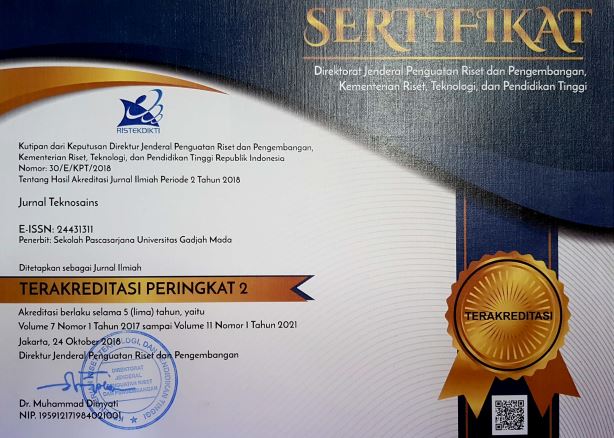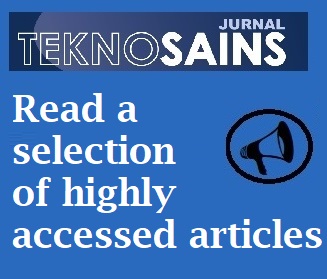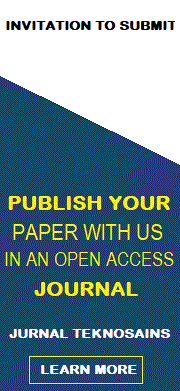Strut Linker Geometry Improving Mechanical Behaviorof Coronary Stent
Rachmat Sriwijaya(1*), Dita Ayu Mayasari(2), Siti Sunarintyas(3)
(1) Department of Mechanical and Industrial Engineering, Faculty of Engineering, Universitas Gadjah Mada
(2) Biomedical Engineering, Faculty of Engineering, Dian Nuswantoro University
(3) Department of Biomaterials Faculty of Dentistry, Universitas Gadjah Mada
(*) Corresponding Author
Abstract
Stent is one of the common solution that is offered to the patient with atherosclerosis. An ideal stent should have good mechanical and biological properties. This research aims to analyze how importance strut linker geometry affect mechanical behavior of stent especially on recoil percentage, foreshortening percentage and fatigue safety factor prediction using finite element analysis. The result showed that strut linker geometry would specify the mechanical behavior
Keywords
Full Text:
PDFReferences
Debusschere, N., Segers, P., Dubruel, P., Verhegghe, B. and De Beule, M., 2015. A finite element strategy to investigate the free expansion behaviour of a biodegradable polymeric stent. Journal of biomechanics, 48(10), pp.2012-2018.
Douglas, G.R., 2012. Design of stent expansion mechanisms (Doctoral dissertation, University of British Columbia).
Dou, Y., Chen, Y., Zhang, X., Xu, X., Chen, Y., Guo, J., Zhang, D., Wang, R., Li, X. and Zhang, J., 2017. Non-proinflammatory and responsive nanoplatforms for targeted treatment of atherosclerosis. Biomaterials, 143, pp.93-108.
Ho, M.Y., Chen, C.C., Wang, C.Y., Chang, S.H., Hsieh, M.J., Lee, C.H., Wu, V.C.C. and Hsieh, I., 2016. The development of coronary artery stents: from bare-metal to bio-resorbable types. Metals, 6(7), p.168.
Hsiao, H.M., Chiu, Y.H., Lee, K.H. and Lin, C.H., 2012. Computational modeling of effects of intravascular stent design on key mechanical and hemodynamic behavior. Computer-aided design, 44(8), pp.757-765.
Khyzha, N., Alizada, A., Wilson, M.D. and Fish, J.E., 2017. Epigenetics of atherosclerosis: emerging mechanisms and methods. Trends in Molecular Medicine, 23(4), pp.332-347.
Mayasari, D.A., Sriwiiava, R., Siswomiharjo, W. and Sunarintyas, S., 2018, August. Free Expansion Behaviour of Coronary Stent Based on Strut Linker Geometry. In 2018 4th International Conference on Science and Technology (ICST) (pp. 1-4). IEEE.
Marrey, R.V., Burgermeister, R., Grishaber, R.B. and Ritchie, R.O., 2006. Fatigue and life prediction for cobalt-chromium stents: A fracture mechanics analysis. Biomaterials, 27(9), pp.1988-2000.
Meraj, P.M., Jauhar, R. and Singh, A., 2015. Bare metal stents versus drug eluting stents: where do we stand in 2015?. Current treatment options in cardiovascular medicine, 17(8), p.39.
Patel, S.M., Li, J. and Parikh, S.A., 2016. Design and Comparison of Large Vessel Stents: Balloon Expandable and Self-Expanding Peripheral Arterial Stents. Interventional cardiology clinics, 5(3), pp.365-380.
Sommer, C.M., Grenacher, L., Stampfl, U., Arnegger, F.U., Rehnitz, C., Thierjung, H., Stampfl, S., Berger, I., Richter, G.M., Kauczor, H.U. and Radeleff, B.A., 2010. Impact of stent design on in-stent stenosis in a rabbit iliac artery model. Cardiovascular and interventional radiology, 33(3), pp.565-575.
van Soest, G., Marcu, L., Bouma, B.E. and Regar, E., 2017. Intravascular imaging for characterization of coronary atherosclerosis. Current Opinion in Biomedical Engineering, 3, pp.1-12.
Xu, J., Yang, J., Huang, N., Uhl, C., Zhou, Y. and Liu, Y., 2016. Mechanical response of cardiovascular stents under vascular dynamic bending. Biomedical engineering online, 15(1), p.21.
Zilberman M, ed. 2006. Studies in mechanobiology, tissue engineering and biomaterials. Springer.
Zilberman, M. ed., 2011. Active implants and scaffolds for tissue regeneration (pp. 1-24). Berlin, Germany:: Springer.
Article Metrics
Refbacks
- There are currently no refbacks.
Copyright (c) 2020 Rachmat Sriwijaya, Dita Ayu Mayasari, Siti Sunarintyas

This work is licensed under a Creative Commons Attribution-ShareAlike 4.0 International License.
Copyright © 2024 Jurnal Teknosains Submit an Article Tracking Your Submission
Editorial Policies Publishing System Copyright Notice Site Map Journal History Visitor Statistics Abstracting & Indexing









